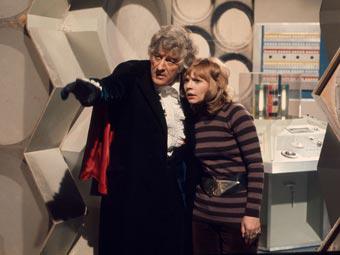Written by Malcolm Hulke
Directed by Michael Briant
The irony of the eighth season, at least so far, is that I tend to dislike the serials that get the most praise, and enjoy the serials that get the most derision. “The Colony in Space” is the perfect example. This is the eighth season serial that I found most engaging and well-paced, and yet it has the lowest reputation among the majority of fans. Go figure!

Perhaps it is the callback, from my perspective, to the moral ambiguities and social commentary of the seventh season. Granted, some of the commentary is a bit outdated; the colonialist attitude in the Western world had long since given way to the proxy conflicts of the Cold War real politik. But just like “Star Trek” did just a couple years earlier, “Doctor Who” couldn’t resist touching on the sins of the past.
In this sense, however, there was still that overarching theme of manifest destiny, something even the Doctor seemed to advocate. Sure, there was a message that colonists must learn to work with the natives, especially natives that may seem primitive, but come from a much older civilization. (Set aside, for now, the questionable notion of natives “devolving” compared to the colonists.)
Consider the Doctor’s immediate backing of the colonists, his desire to see them reach common ground with the “primitives”, all while taking the attitude that any hostile animal life could simply be “destroyed”. All, of course, while moralizing how the population of Earth was overwhelming the homeworld with pollution and environmental catastrophe! The enemy here is clearly corporate greed over more basic human endevours.
It all seems a bit overwrought, but consider why: those exact same concepts and arguments are playing out in today’s society. The control of politics by powerful corporations, impinging on the basic freedoms of the “little guy”, all of it is reflected in the news each and every day. I suspect some of the dissatisfaction with the story, looking back on it, is the uncomfortable familiarity. We reject some of the old prejudices buried in the premise, all while recognizing all too well the elements that still hound us.
But getting back to the Doctor for a moment, I like the fact that his perspective is flawed. He takes to the colonists’ side very quickly, and seems so intent on making the colony work that he makes suggestions that appear to undermine his own moral high ground. At least part of it is his heady, giddy response to sudden freedom, even if he doesn’t realize that it’s all due to the Time Lords using him. It reinforces how his characterization in the earlier serials this season is spot on, completely justified by his natural reaction to being exiled and imprisoned.
This is by far my favorite serial with the Master as well, because it finally puts the relationship between the Doctor and the Master into clear perspective. Both of them are renegades, mavericks in Time Lord society, which made them natural allies. They probably got along splendidly on Gallifrey at one point. But where the Doctor rebelled because his passion for science led him to see the universe in all its diversity, the Master wanted to use the Time Lords’ abilities to gain control.
It’s a fine line, because the only real difference is that the Master seeks power for its own sake. He really never seems to have a basis for why he wants it or a plan for what to do with it. As much as the Doctor claims to have no desire to control the universe, he spends most of his time correcting problems that offend his moral sensibilities. In a very real sense, the Doctor is doing exactly what the Master is doing, only on a much smaller scale and (most of the time) without circumventing the agency of those he helps.
The Doctor’s role in the conflict between the colonists and the IMC, along with the interaction with the primitives, is all designed to feed into that moment when the Master offers him partnership. It becomes clear why the Master holds the Doctor in such high regard, why he constantly conspires to gain the Doctor’s approval. And it’s equally clear why the Doctor both considers and rejects the Master’s offer.
This is what I love about the Doctor: for all that he’s clearly the good guy, he’s got some major flaws. He may be an alien, but he’s frightfully human in his pride and arrogance. He has blind spots the size of the Crab Nebula, and he often lets his enthusiasm over the novel to overcome his better sense. And let’s face it: he’s also done things that, in a different light, could be seen as horrific, all in the name of the greater good and “how things should be”.
And maybe that’s why I liked this serial so much: the characters are well-drawn, the conflicts have historical and contemporary resonance, and this informs the core psychology of the Doctor better than a lot of other serials. I’d even go so far as to say that Jo gets a much better treatment, because she’s outside of the confines of the “UNIT family”. She’s still a bit naïve and annoying, but her “fish out of water” depiction makes more sense in this context.
Or maybe it’s just the fact that the Doctor is back to wandering through space and time, even if it’s a momentary break in the Earthbound format due to Time Lord interference. It’s another sign that the writers were chafing at the constraints in the storytelling, and yearning for the opportunity to get back to more varied storylines. And for my own part, I see it as another story that, with perhaps a bit of tightening up and a more modern approach, could serve as the basis of a NuWho episode.
Writing: 2/2
Acting: 2/2
Direction: 2/2
Style: 2/4
Final Rating: 8/10

